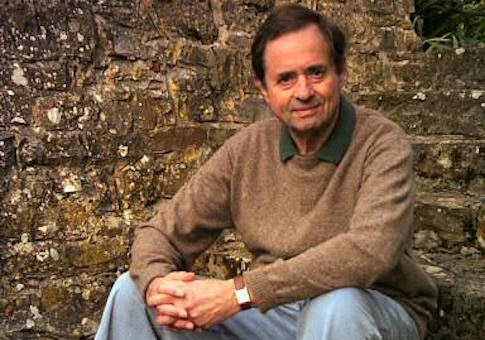Australia/Israel Review
Biblio File: A Life Less Ordinary
Aug 10, 2016 | Daniel Mandel

Daniel Mandel
Fault Lines
David Pryce-Jones, Criterion Books, New York, 2015, 364 pp., US$25.00
David Pryce-Jones’ writings span over five decades. Over that time, he has produced a series of books chronicling unusual lives with implausible loyalties and the destructive and self-destructive movements which attracted them.
On the question of the underlying motif uniting such diverse individuals as Graham Greene, Evelyn Waugh, Unity Mitford and Cyril Connolly, and such varied subjects as the Hungarian Revolt, Paris in the Third Reich, the Arab world and the collapse of the Soviet Union, Pryce-Jones said this in an interview with me more than 20 years ago: “I’m fascinated with the question – why do people do the very strange things they do?”
I and doubtless others have wondered how he came upon this fascination. Now, with his autobiography before them, readers will find their wait for an answer to that question well worth it. Pryce-Jones has given us a vivid yet understated portrait of the rarefied world into which he was born in Vienna in 1936, a world of country estates, lavish apartments on broad boulevards and liveried servants – and what happened to it.
It was his great-grandfather, the prominent entrepreneur Gustav Springer, who coined the advice, “Buy to the sound of cannons and sell to the sound of violins,” (often wrongly attributed to one of the Rothschilds – to whom Pryce-Jones is also connected). Wise choices of this kind led his forbears to accumulate a fortune and enter the Continent’s aristocracy. The offspring of an unlikely match between a British man of letters from a landed Welsh family, Alan Pryce-Jones, and a Jewish heiress, Thérèse (‘Poppy’) Fould-Springer, Pryce-Jones grew up in Royaumont, a home adjacent to a famed Cistercian abbey laid waste by the French Revolution.
From the start, the family, immediate and extended, was a curious hybrid, made still more curious by Alan’s homosexuality. Pryce-Jones describes his family circumstances as “not quite Jewish and not quite Christian, not quite Austrian and not quite French or English, not quite heterosexual and not quite homosexual, socially conventional but not quite secure.” Add to this Alan’s vaulting literary ambitions, ill-matched to his talent and temperament, and Thérèse’s post-natal depression and seeming inability to love, and the complexities of Pryce-Jones’ upbringing become readily apparent – even had the cataclysmic interruption of the Nazi invasion of France never happened.
When in May 1940 the Nazis poured into the Low Countries and France, Pryce-Jones’ parents were in London, obliging his nanny at Royaumont to sweep him away ahead of the advancing Germans, finding refuge in the south of France, then Spain (courtesy of visa supplied by his relative by marriage, Spanish diplomat Eduardo Propper de Callejón, later honoured by Yad Vashem for aiding fleeing French Jews), Morocco and eventually England.
Courtesy of totalitarianism, the rarefied world of Pryce-Jones’ earliest years had irrecoverably crumbled into dust; more broadly, tradition, custom, stability and the heritage of centuries dissolved, swept up in millenarian visions that enjoined that war and destruction must be the prelude to a new Utopian dispensation. Indeed, much of Pryce-Jones’ writing is an indirect lament for societies enveloped and expunged by political tsunamis.
More than once in his career, Pryce-Jones was to examine individuals who permitted themselves to be swept up in these toxic passions, as well as those who took no part but sympathised with the murderous. Close observation and personal experience alike lead him to see these forces from the standpoint of their victims, to juxtapose the promises of a new day alongside the record of blood-letting. This standard of judgment he applied not only to Nazism and fascism, but also to communism, Arab nationalism and, in our own time, the revival of jihadism across the Middle East. As he and others have found, this sort of moral consistency earns the brickbats and ostracism of the apologists, the fellow-travellers, the Arabists and now the post-colonialists.
In England, the blitz and war-time austerities afflicted one and all, but in the peace that followed, life proceeded for a time on an English gentleman’s course: Eton, Oxford, the Coldstream Guards, a stint of national service during the 1956 Suez crisis. The Gramsci-like purge of all but left-wingers from the academy, decried routinely today by conservatives, was already well in progress then: at Oxford, he “took on the protective covering of infantile Leftism that was the key to peaceful tutorials and a decent degree.” For all this, Pryce-Jones never hit it off with his history tutor, AJP Taylor, who declared of his student at high table, “It would do this young man good to go hungry and have to steal his food.” Later notorious for his revisionist book The Origins of the Second World War, Taylor, we learn here, during the storm surrounding its publication, crowed, “This time I’ve trod on their toes” – meaning his fellow historians, like Hugh Trevor-Roper, who occupied the Regius Chair of Modern History at Oxford that Taylor believed had been rightfully his.
The philosopher and historian of ideas Isaiah Berlin is another towering figure of the university, given terse but vivid portraiture here. Though thoroughly acquainted with the Soviet depredations upon subject peoples, Berlin emerges as one who charted a deft course through the shoals of moral courage to remain in good odour with the leftist elites of his day.
After toying with the idea of diplomacy, Pryce-Jones moved into the world of journalism, first as a literary editor before becoming a Middle East correspondent for the Daily Telegraph during the 1967 and 1973 Arab/Israeli wars and visiting the region with increasingly frequency. Here, too, much that had been good or at least solid had been wiped away by the Nassers and Ben Bellas, who had been promising Arabs the world upon the departure of the colonial powers.
A wealth of experiences undergirds his writing about the Arab world, along with an enormously rich acquaintance with persons great and small, whether it is a meeting with David Ben Gurion, or rushing to convince Palestinians fleeing the West Bank in the aftermath of Israel’s Six Day War victory that they needn’t leave; or meeting an array of Jew-baiting figures. The last include a British ambassador in Lebanon who, over dinner, described Israelis as Nazis, and the writer Harold Pinter, who once got up and walked out on a dinner he was hosting for Nobel Laureate VS Naipaul and his wife Nadira when the latter mentioned that they were friends with the Pryce-Joneses.
How many people get interrupted weeding their garden to be told by a neighbour that he is bringing Princess Margaret around? Better still, who can claim to have played tennis with a topless Greta Garbo? Science fiction writer HG Wells, in a boat with Pryce-Jones’ mother Poppy, correcting proofs of a new novel, made a pass at Poppy and got his manuscript thrown into the lake for his troubles. Poet John Betjemen’s wife took the author for rides in her pony trap while Pryce-Jones’ grandparents entertained such figures as Somerset Maugham, Noel Coward and an array of European blue bloods while in Portuguese exile.
Formative influences on Pryce-Jones turn out to be not only an array of examples to be avoided, but rare individuals who debunk the cant and shallowness of their era. Pryce-Jones has written elsewhere of the profound influence of Elie Kedourie, who once advised him to ignore the chatter about ideas and look instead for the corpses they produced. Kedourie’s profoundly erudite writings on the Arab world, nationalism and minorities changed for many the way they viewed the Middle East, and Pryce-Jones is one of them. Vignettes about this region’s travails abound in Pryce-Jones’ books and articles, but one in this memoir stands out for me. Writing of the Arab defeat of 1973, he observes, “It appeared impossible to admit this disaster, indeed parties of school children are taken round the military museum in Cairo that presents as victory a war that ended with Israeli tanks closing on Cairo. In their culture, the dread of shame is so strong it enforces denial of reality. Mistakes are inadmissible, and repetition therefore takes the place of correction.”
This is not just an evocative memoir of events and personalities, of times and places. It is also an unassuming but revealing portrait of a growing man with a complex past who finds fulfilment in marriage, warm friendships and a quest for the truth that lies behind affairs of state and the heart – while negotiating the losses and disappointments that come with them. The last include being cheated out of his Royaumont inheritance and the loss of a dear two-year-old daughter to sudden illness – both conveyed with power and economy. This is a book to treasure, a rich reminiscence, rendered by a master. Others already have called it a classic, and I see no reason to disagree.
Dr. Daniel Mandel is Director of the Zionist Organisation of America’s Centre for Middle East Policy and author of H.V. Evatt and the Establishment of Israel (Routledge, London, 2004).
Tags: Europe






